Dental Implants — Chesterfield, MO
Rebuild a Complete, Confident Smile
Losing a tooth is a devastating event, and it’s one our team here in Chesterfield doesn’t take lightly by any means. Not only is your oral health compromised, but your self-confidence as well, making it hard to smile due to fear of judgment or embarrassment. You don’t have to suffer in silence. Instead, let Dr. Jeff Yenzer turn back the clock on your oral health and beauty with the help of dental implants in Chesterfield, MO. This transformative treatment option offers results that are comfortable, durable, and simply seamless.
Why Choose Yenzer Family Dental of Chesterfield For Dental Implants?
- State-of-the-Art Dental Technology for Precise Results
- Able to Replace Any Number of Missing Teeth
- Fair & Honest Fees with No Surprises
What Are Dental Implants?
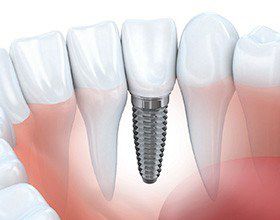
When we talk about dental implants, we’re technically referring to the surgically placed portion that sits inside of the gum and bone tissue. These posts are designed to act as artificial roots and are made from medical-grade titanium. This biocompatible material allows the implants to fuse with the jawbone, ensuring the sturdy support necessary to hold a dedicated restoration (such as a dental crown, bridge, or denture.) This unique placement ensures that basic functions, including chewing and speaking, feel incredibly natural. As such, it’s no wonder that dental implants are regarded by patients and dentists alike as the gold standard of tooth replacement!
Learn About All-on-4 Dental ImplantsThe 4 Step Dental Implant Process
Before you start a dental treatment plan as complex as dental implant tooth replacement, you’ll want to take plenty of time to discuss the treatment plan, schedule, and budget. During a tooth replacement consultation, we’ll review the entire process to help you understand what to expect from your individual treatment plan. On this page, we’ll review the basics of how dental implants work, but to get a more specific treatment plan, call Yenzer Family Dental of Chesterfield to schedule your consultation appointment to discuss how dental implants work with Chesterfield, MO dentist, Jeff Yenzer, DDS, and his dentistry team.
Initial Dental Implant Consultation
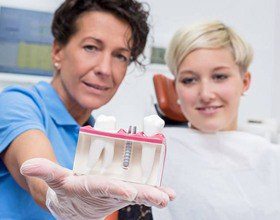
Before we get started with the multi-phase dental implant tooth replacement process, we need to make a plan. During your dental implant consultation, we’ll review your oral and overall health history, discuss current medications, past experiences with surgical treatment, and a variety of other variables that will impact your treatment plan. Then, we’ll outline the entire dental implant tooth replacement process, including the cost and timeline.
Dental Implant Surgery

Before we place one or more dental implant posts, we may need to perform preparatory treatments like tooth extraction or tissue grafting. Once your smile is prepared, we will surgically place your implant posts. This procedure is minimally invasive. We begin by making a small incision in the gum line. Then, we place the implant into the jawbone. A protective cap is positioned over each implant post to protect it during healing.
Dental Implant Osseointegration/Abutment
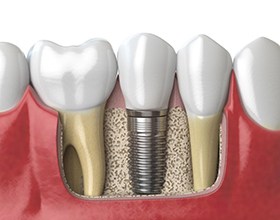
Following the placement of your dental implants, you’ll need to wait for several months in order to allow the dental implant to fuse with the bone and gum tissue. Once the implants are fully anchored to the supportive structures, we’ll place abutments. These connector pieces allow us to attach the implant to the replacement teeth. After placing the abutments, we design your dental crown, bridge, partial, or full denture.
Delivery of Dental Implant Restorations
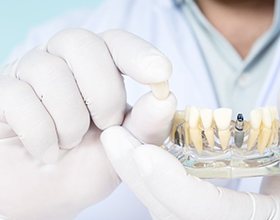
After the placement of your abutments, we will need to wait for the dental lab to custom craft your final restoration. Once we receive them from the lab, you’ll return to the dental office so we can attach your crown, bridge, or denture to the dental implant posts, recreating your flawless smile.
Benefits of Dental Implants

Your teeth consist of two parts: your root and your crown. Traditional tooth replacement options only bring back the crown — but not dental implants. They are the only solution to recreate the entire tooth. Once the implant post is placed in your jaw, it fuses to the surrounding bone to create a secure and stable foundation for your replacement tooth while also protecting your bone density. This one-of-a-kind placement provides unmatched comfort, functionality, longevity, peace-of-mind, and so much more!
Day-to-Day Benefits

Here are just a few of the lifestyle benefits of dental implants in Chesterfield:
- The restorations that go on top of your dental implants are custom-designed in order to resemble real teeth as closely as possible. Most people won’t even realize you had dental work done in the first place!
- Because the root structure of your teeth is renewed, so is your biting force. You’ll be able to chew all of your favorite foods with ease – unlike with dentures, which can make it difficult or even impossible to enjoy crunchy or tough foods.
- Sipping hot beverages, like tea or coffee, can warp the shape of traditional dentures. Implant restorations, on the other hand, should maintain their personalized fit no matter what you drink.
- Your new teeth will be firmly anchored within your jaw, allowing you to speak, eat, and smile without worrying about your pearly whites slipping around or falling out of your mouth.
Health Benefits
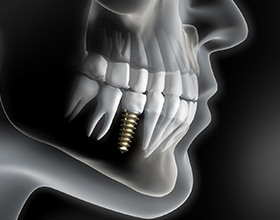
Dental implants also improve your health in the following ways:
- After a tooth is gone, the underlying jawbone will start to break down because the body has determined that it is no longer needed. However, dental implants can reverse this process. They act as new roots that can stimulate the bone and encourage the growth of new tissue, thus maintaining a healthy level of bone density.
- Dental implants are self-supporting and do not rub up against the gum tissue, so you can avoid the need to alter existing tooth structure as well as gum sores and irritation.
- In most cases, taking care of your dental implants involves routine brushing, flossing, and checkups with your implant dentist in Chesterfield – not much more than the care you would give to natural teeth. Because of their simple maintenance, dental implants naturally promote better oral health, which in turn improves your overall health.
Long-Term Benefits

While you can extend the lifespan of a dental bridge or denture with good oral care, you can usually expect them to last only about 10 years or so. Dental implants, by comparison, have a much longer lifespan of 30 years or more. In fact, it’s completely possible for them to last the rest of your life with proper maintenance. This is due to the fact that dental implants are made out of titanium, which is not only highly durable, but also bio-compatible, meaning it won’t be rejected by the body.
Who Dental Implants Can Help
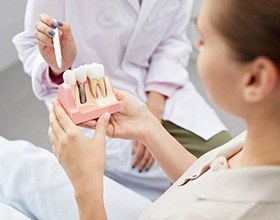
Whether you’re missing one tooth, many teeth, or an entire arch, dental implants can rebuild a complete, confident smile that you’ll be excited to show off once again. First, we’ll ensure that you’re a good candidate for dental implants during your initial consultation by checking your oral health and jawbone density. Then, we’ll review all your tooth replacement options and help you choose the best type of dental implant for you!
Who Is a Good Candidate for Dental Implants?

Thankfully, practically any adult in good health suffering from missing teeth can get dental implants! However, not all our patients start out as good candidates. But there’s no need to worry! We’ll help you overcome whatever obstacles stand between you and the fully, healthy smile you deserve. Generally, you’re considered a good candidate for dental implants if you have:
- A mouth free of oral health conditions like cavities and gum disease
- Enough jawbone density to support dental implants
- Willingness to commit to great oral hygiene
Dental implants can fill the empty spaces in your smile. While they are often used to replace a single tooth, they can also provide an alternative solution to traditional bridges and dentures when replacing several or all your missing teeth.
Missing 1 Tooth
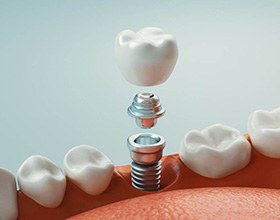
An implant post is placed into your jawbone. After adequate healing has occurred, an abutment is connected to the implant post. This allows a custom-made restoration to be attached to the post.
Missing Multiple Teeth
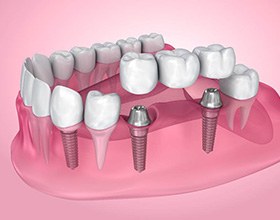
A bridge of prosthetic teeth is created to close the gap between your remaining natural teeth. Instead of capping your adjacent teeth, an average of 1 or 2 implant posts are used to hold it in place.
Missing All Teeth
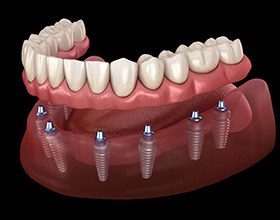
When replacing an entire arch, you no longer need to rely on an adhesive or suction to hold the denture in place. By placing dental implant posts into your jawbone, it will be held securely in place to complete your smile.
Learn More About Implant Dentures
Understanding the Cost of Dental Implants

The cost of dental implants in Chesterfield varies depending on your exact needs, such as the number of teeth that are being replaced. During your initial consultation, Dr. Yenzer will provide you with an accurate estimate and discuss the various factors that will influence the final cost.
Although dental implants can cost more upfront than traditional restorative options, they have the potential to last for decades with proper care. Due to their many benefits and long-lasting nature, dental implants are usually a wise investment in a person’s oral health and quality of life.
Preliminary Treatments & Dental Implant Surgery
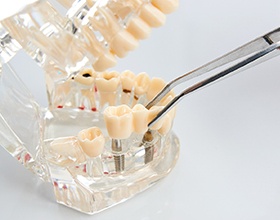
During your consultation, we can confirm if you will need to undergo any preliminary treatments. Bone grafts, periodontal (gum) therapy, and other procedures may be necessary to restore your oral health or strengthen your jawbone. Preliminary treatments contribute to overall costs but are critical to successful implant treatment.
The implant placement surgery, which often involves anesthesia, also incurs its own cost. An experienced implant dentist in Chesterfield, Dr. Yenzer performs start-to-finish implant treatment right here at our office. This means you won’t have to schedule (and pay for) a separate appointment with an oral surgeon for implant placement.
The Parts of Your Dental Implant

The materials used to make your dental implants will also affect the cost of treatment. Most dental implants are crafted from extremely durable titanium or zirconia.
There are also many different implant manufacturers. Just like some brands of cars are more reliable than others, some implant brands have earned their outstanding reputations for quality. Dr. Yenzer will gladly share more details about which dental implants he uses and why during your initial consultation.
Final Dental Implant Restoration

How many teeth you replace and which type of restoration you need will also affect the overall cost of your dental implants. There are three main types of implant-supported restorations:
- Crown – One dental implant and a custom dental crown can replace a missing tooth.
- Implant Bridge – A bridge supported by two dental implants at either end can replace several consecutive missing teeth.
- Implant Denture – Four to six dental implants can secure a denture and replace an entire dental arch.
Does My Dental Insurance Cover Dental Implants?

In most cases, dental implants in Chesterfield are not covered by dental insurance. However, you may be able to use your insurance benefits to cover other aspects of implant treatment. This includes periodontal therapy, the initial consultations to determine eligibility for dental implants, and even the restorations used to cover them. Our knowledgeable team will be happy to help you review the details of your insurance plan and will strive to maximize your benefits.
Making Dental Implants Affordable
At Yenzer Family Dental, we are dedicated to helping our patients achieve their smile goals without busting their budgets. While we are in-network with many dental insurance providers, we also offer low-interest financing through CareCredit. A trusted partner, CareCredit provides custom monthly payment plans for dental implants and other dental treatments. By splitting of the cost of dental implants in Chesterfield into smaller, more convenient chunks, you can restore your smile without financial stress.
If you are ready to regain a complete smile, we can help! Contact our dental office today to schedule your consultation.
Dental Implants Post-Op Instructions
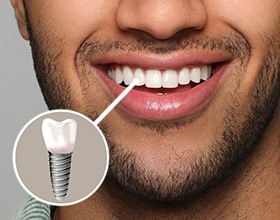
Dental implant treatment doesn’t stop when the surgery is over. Once the implants are placed, your mouth and jaw need a few months to heal and adapt. Only after they recover will the new teeth show all their benefits. With that said, we at Dr. Yenzer’s office want to help you through this recovery process. We’ve listed some vital dental implant post-op instructions below that should be helpful. So, please keep reading to learn them or call our office.
What to Do Directly After Dental Implant Surgery

Following implant surgery, the most crucial thing is to let the blood clot form. You’ll otherwise delay or even reverse your recovery. Therefore, make sure to follow these rules:
- Don’t smoke on the day after your implant surgery.
- Refrain from spitting; swallow your saliva or use a tissue for dabbing if necessary.
- Avoid using straws, as their suction force can dislodge the blood clot.
- Keep your fingers and tongue away from the surgical site(s) for a few days.
Common Side Effects When Recovering from Dental Implant Placement

Some side effects are normal right after implant placement. In fact, you may experience any of the following:
- Gum or Facial Swelling – Your gums and face could swell in the first 72 hours post-surgery. If they do, apply a cold compress to reduce the swelling.
- General Discomfort – It’s common for the implant site to ache a bit after surgery. To ease your pain, use store-bought pain relievers.
- Intermittent bleeding – In the days after placement, your treatment site could bleed slightly. Apply gauze and light pressure if that happens to lessen the bleeding.
While they aren’t ideal, know that these side effects are short-lived; they’ll fade after a few days. You should contact our office and see us if they don’t.
Your Diet After Dental Implant Surgery

It’s best to follow a soft food diet in the first few days after implant surgery. Chewing tough meals could dislodge your blood clot and reverse your recovery progress.
To be specific, items you could have with a soft food diet include:
- Scrambled Eggs
- Yogurt
- Soft Cheese
- (Non-hot) Soup
- Mashed Potatoes
- Sweet Potatoes
- Pasta
- Pudding
Feel free to resume your normal diet when you feel ready. Still, try to go easy on crunchy and tough foods. You also shouldn’t chew directly on the implant site(s).
Post-Op Health & Oral Hygiene

Even though it’s healing from surgery, your mouth still needs daily cleaning. You ought to practice good oral hygiene while you recover. Just make a few changes to the relevant routines when you do.
For example, keep brushing your teeth twice daily. This habit defends the treatment area from plaque. However, brush extra gently when you're near the surgical site. Applying too much force will dislodge your blood clot.
You should also continue to rinse your mouth, as doing so reduces your post-surgery inflammation. Simply switch out your regular mouthwash with twice-daily saltwater rinses. If you use an oral rinse with alcohol content, you’ll disturb the implant site.
What to Do After Your New Teeth Are Attached

When your new crown, bridge, or denture is attached, the hard part is over. The most you’ll face is some minor gum sensitivity – a symptom that fades quickly. As a result, you’ll be ready to enjoy your full smile!
Dental Implant Failure & Salvage

Even though dental implants are highly reliable, it’s still possible for them to fail. Upon realizing that there’s a problem with your dental implant posts, your first move should be to call our office. We’ll make arrangements to see you as soon as we can to examine your mouth and identify the root of the problem. Once we know what caused your dental implants to fail, we can work with you to put together a plan for salvaging your repaired smile.
Learn More About Dental Implant Failure & Salvage
Maintaining & Caring for Your Dental Implants

Dental implants have the potential to help you enjoy a full, strong, and beautiful smile for the rest of your life! However, that’s only possible if you take care of them properly. Without protection, your dental implants may fail due to damage or infection. Thankfully, with a few easy precautions, you can enjoy your newly restored smile for decades to come. Keep reading to learn more about dental implant care in Chesterfield.
Make Oral Hygiene a Priority

One of the many benefits of dental implants is that they can be cared for similar to your natural teeth. While the implants themselves cannot get cavities, it’s vital that you practice good at-home oral hygiene because issues like gum disease can cause them to fail. That’s why you should be sure to brush twice a day and floss once a day to remove plaque and bacteria that build up on the smile. Additionally, pay close attention to your gumline while you brush so you can avoid infection or inflammation.
Eat a Healthy Diet

Along with your oral healthcare routine, your diet has a significant impact on the condition of your smile. Dental implants in Chesterfield allow you to eat whatever you want, giving you the ability to enjoy a delicious and nutritious diet. However, be careful not to overindulge in extra sticky, hard, or sugary foods – these items cause higher risks of infection, decay, and damage. Instead, try to eat foods that contain calcium and vitamin C to keep your jawbone and gums healthy.
Break Bad Habits

Dental implants have a success rate of 95% even after 10 years, however there is still a slight possibility of failure. This is usually due to bad habits like smoking, using tobacco, using your teeth as tools, or chewing on hard objects. Tobacco can not only cause infection, but it slows down the healing process. Additionally, using your teeth for anything other than eating or speaking will put your implants at risk of damage.
Protect Your Dental Implants
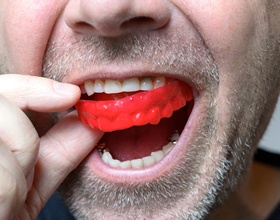
Do you play sports or participate in physical activity? If so, it’s imperative that you protect your implants with a mouthguard. We custom make mouthguards to protect smiles and limit concussion from force. Even if you don’t think the sport you play is physical, it’s still a good idea to play it safe and wear protection. Additionally, bruxism (teeth grinding) can cause damage to implants. That’s why you should wear a nightguard during sleep to relieve pressure and avoid implant failure.
Schedule Regular Dental Checkups
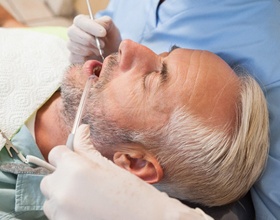
Last but certainly not least, don’t forget to visit our implant dentist in Chesterfield, Dr. Jeff Yenzer, for routine checkups. During these simple and convenient visits, he will carefully examine your mouth to ensure that your implants are still healthy and functioning properly. These appointments allow Dr. Yenzer to catch any issues early to prevent the implants from failing, saving you time and money in the future from avoided replacements.
Dental Implant FAQs
Out of the all the dental procedures, dental implants in Chesterfield can be one of the most complex, so it’s natural if you have questions about them. At Yenzer Dental, we want to help you feel confident in your tooth replacement selection, and we’re happy to address any uncertainty or confusion you may have. We invite you to read the responses below to some of the most common questions we get, but we also encourage you to schedule an appointment with us so that we can discuss your concerns.
How Long Does the Implant Process Take?
The total treatment time can vary from patient to patient, depending mainly on how long it takes the jawbone to integrate with the implant. This process, called osseointegration, typically requires three to six months. We’ll monitor your jawbone’s growth and make sure it is strong enough before we complete the implants with your restoration(s). That way, you’re sure to enjoy your replacement teeth for a long, long time afterward.
What Can I Eat with Dental Implants?
Your diet options are almost limitless with dental implants. Basically, you can eat everything you used to eat with your natural teeth. There are, however, some things you should avoid if you want your implants to last for a long time, like chewing on ice or other hard foods. Sticky candy can dislodge the restoration, but it shouldn’t disturb the implant underneath. Otherwise, you have the freedom to enjoy the same foods you did before with stable, strong teeth.
Am I Too Old for Dental Implants?
There is no age limit for dental implants. Whether you’re 20 or 100, all that is needed is a healthy mouth and a jawbone that can support the implants. Even if you don’t initially qualify, we may be able to treat what is standing in your way (e.g., gum disease or insufficient jaw bone) and get you in a position to receive dental implants. During your consultation, Dr. Yenzer, your implant dentist in Chesterfield, will make sure you’re a good candidate before we get started so you’re set up for success.
Does Attaching My Dentures to Implants Really Make a Big Difference?
It makes all the difference in the world! Using suction to stay in place, traditional dentures lay on the gums’ surface, which means that they can be very insecure. In fact, research shows that dentures alone only restore about 25 to 30 percent of your original biting force. Compare that to implant dentures, which are grounded in the jawbone; they can restore around 70 percent of your biting power, enabling you to eat nutritious foods.

